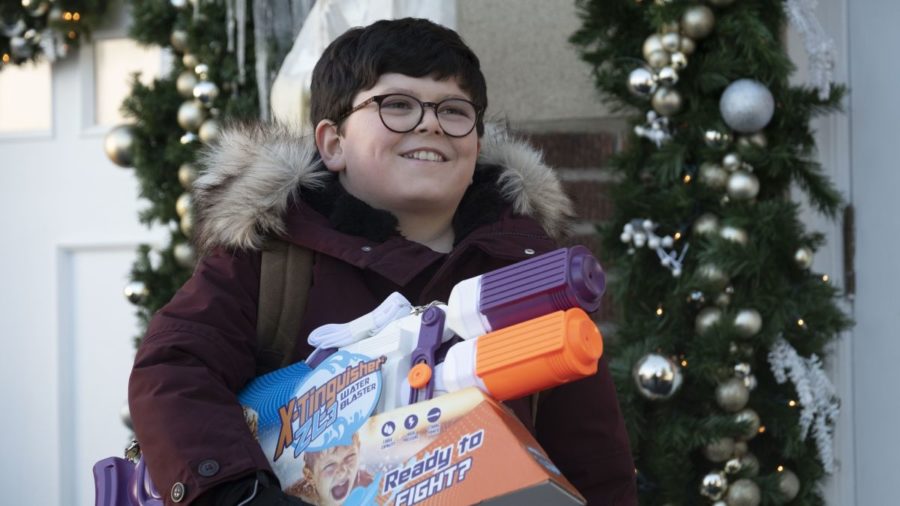“Home Sweet Home Alone” confirms that Disney should’ve left the franchise alone
“Home Sweet Home Alone” (2021), starring Archie Yates (above), is the latest in a series of franchise flops.
November 19, 2021
I don’t think anyone was particularly expecting this movie to be any good.
“Home Alone” came out in 1990, directed by Chris Columbus, who later went on to direct “Harry Potter and the Sorcerer’s Stone,” and written by John Hughes, of “Ferris Bueller,” “National Lampoon’s” and “Breakfast Club” fame. Along with the irresistible charms of child actor Macaulay Culkin, who played main character Kevin McCallister, hilarious hijinks and a touching Christmas theme, the film became an instant holiday classic. Realizing the dream every kid has of doing whatever they want without parental supervision, the plot centered around Kevin as he is accidentally left behind by his dysfunctional family when they go on a trip to Paris. Following his glee at discovering independence and subsequent realization of the value of family, his mother’s slow journey back home to reunite with Kevin, along with a subplot about discovering the humanity of others, the film has wormed its way into the hearts of many and has become a Christmas staple.
The most iconic element of the movie, however, is the sheer mayhem of Kevin’s attempts to stop two house burglars as he booby-traps the house using his childhood toys and household items. The traps are devious in nature but hilarious to watch in action, with the third act full of prat-falls, slapstick and set pieces.
While it is incredibly entertaining to watch the two burglars get slowly beat up by Kevin’s traps, the true appeal of the movie is its heart and humanity. Containing a strong focus on family and generosity, the film manages to be truly sentimental and touching at times. It helps that “Home Alone” is immensely quotable and is accompanied by a lively and jolly John Williams score, allowing it to truly become a film for the ages.
With its huge success, it was no surprise to see a multitude of sequels come out over the years, all trying to recapture the magic of the original. All of them feature a child left behind accidently, left to fend for themselves against burglars. Only the second film, “Home Alone 2: Lost in New York,” stars Macaulay Culkin and the original cast, and not surprisingly it is also the best sequel of the bunch. The rest are varying levels of trash trying to wring out a single drop more of revenue from the original’s popularity. However, with it being years without nary a mention of a continuation, people hoped that Hollywood was done beating the dead horse of a franchise. That all changed after the 2019 acquisition of 21st Century Fox, transitioning the rights to the “Home Alone” intellectual property to the Walt Disney Company. And with the launch of the new streaming service, Disney+, Disney suddenly had the overwhelming need to shovel up as much new content as possible in order to pad out their streaming offerings. Well, they might have dug a bit too far and unearthed the grave of “Home Alone,” resurrecting it for another adventure. And boy, they really did not need to.
Titled “Home Sweet Home Alone,” the newest installment in the franchise is one of the most tonally confusing films I’ve ever seen, lacking any real reason for existence. Starring Archie Yates, who debuted in the 2019 “Jojo Rabbit” as the adorable Yorki, as the lead child, Max Mercer, this time around, all charm from the original is completely gone due to a series of baffling choices. First, Max is an absolute brat of a child, with few redeeming qualities, making it an absolute chore to watch him on screen. On the other hand, the burglars in this film are incredibly endearing, with rational reasons for their need to break into Max’s house. Now on the surface, the idea of making the child the villain and the burglars the protagonists is not necessarily a bad one, but in execution the entire thing falls apart. After going through several scenes where audience members empathize with the McKenzies, a married couple going through hard financial times played by Rob Delaney and Ellie Kemper, we still see them be absolutely maimed and brutalized by Max. It’s almost mean-spirited in nature, with Max’s traps containing none of the fun of the original but rather a brutalistic streak. The couple just doesn’t want to lose their house and they are absolutely tortured for it. A lot of the traps also don’t really make much logical sense either, with one scene having a real misunderstanding of how VR technology really works. In addition, it is frustrating how the conflict is prolonged when some simple communication could have resolved the entire issue.
The film lacks any genuine character development and life lessons learned and, frankly, has a rushed and bewildering ending. All this makes it apparent just how blatant of a cash grab this is. Despite a talented cast, the film’s lack of any real artistic statement mars the entire experience, instead making the film simply a vehicle for bolstering Disney’s catalog and nothing more. This is the end result when industry concerns drive content creation, leaving nothing but a hollow, soulless mess.



